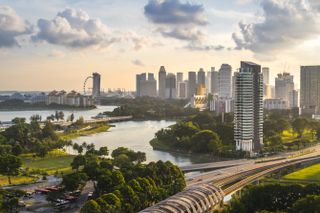Singapore relaxes its grip on data centre industry with sustainability pilot
Data centre companies can now apply for new data centre capacity, as long as the installations allow for sustainable growth

Singapore has called on its data centre industry to submit applications to a pilot project that aims to improve sustainability across the sector.
The state’s Economic Development Board (EDB) and Infocomm Media Development Authority (IMDA) are looking to partner with industry players that want to build extra capacity and create data centres that bring in state of the art technologies.
The two organisations are also looking for best practices for sustainability, especially in the areas of energy efficiency and decarbonisation.
The pilot, which will close on 21 November 2022, is also seeking to strengthen Singapore’s international connectivity and position as a regional hub. It's hoped successful applicants will make a significant contribution to Singapore’s broader economic objectives.
EDB and IMDA are also set to continue to partner with the industry for greener data centres in the future.
“The pilot call for application exercise by EDB and IMDA seeks to leverage on the expertise and capabilities of the industry to further push the technology boundaries in these areas, and help level up the baseline for the sector, while providing new capacity for data centre growth to support our digital economy,” the two organisations said.
The state has had a moratorium on the creation of new data centres since 2019, which is concerned over the vast amount of land resource, water, and energy being consumed by data centres.
Get the ITPro. daily newsletter
Receive our latest news, industry updates, featured resources and more. Sign up today to receive our FREE report on AI cyber crime & security - newly updated for 2024.
This new pilot is considered the first step towards lifting that moratorium, with new designs focusing on greater sustainability and lower resource demand.
Going forward, Singapore will have to manage the growth of its data centre capacity in a sustainable way, consistent with its climate change commitment, said the EDB and IMDA.
Since the moratorium was imposed, the EDB and IMDA said they’ve had extensive consultations with the data centre sector, their industrial customers, and sustainability solutions providers to determine the parameters for the installation of new data centre capacity.
What will Singapore authorities be looking for in the sustainable data centre proposal?
There are a number of key requirements that industry partners will have to meet. Applicants will need to demonstrate they’ve achieved a platinum certification under a prevailing Green Mark for New Data Centre criteria, a green building rating system for data centres. They will also have to design, build, and operate a data centre that is best-in-class in terms of efficiency, and achieve at least a Power Usage Effectiveness (PUE) of 1.3 or better.

The Total Economic Impact™ of IBM Security MaaS360 with Watson
Cost savings and business benefits enabled by MaaS360
The data centre companies will also have to demonstrate optimisation of IT energy efficiency through use of equipment that meets or exceed best-in-class IT energy efficiency standards and adoption of measures with users to optimise equipment utilisation.
When it comes to decarbonisation, the applicant will need to provide proposals on how it will best achieve sustainability goals through renewable energy, and demonstrate how it plans to invest in innovative energy pathways, such as hydrogen or building integrated photovoltaics, to offset its carbon emissions footprint.
Applicants will also have to show how their proposal would strengthen Singapore’s value proposition as a key data centre and technology hub for the region, as well as Singapore’s regional/international digital connectivity.
Lastly, the data centre companies must indicate the fixed asset investments and total business expenditure for the data centre. They should also propose other desirable business activities that can contribute to the broader economic value and outcomes for Singapore, like R&D or product development.
Zach Marzouk is a former ITPro, CloudPro, and ChannelPro staff writer, covering topics like security, privacy, worker rights, and startups, primarily in the Asia Pacific and the US regions. Zach joined ITPro in 2017 where he was introduced to the world of B2B technology as a junior staff writer, before he returned to Argentina in 2018, working in communications and as a copywriter. In 2021, he made his way back to ITPro as a staff writer during the pandemic, before joining the world of freelance in 2022.





